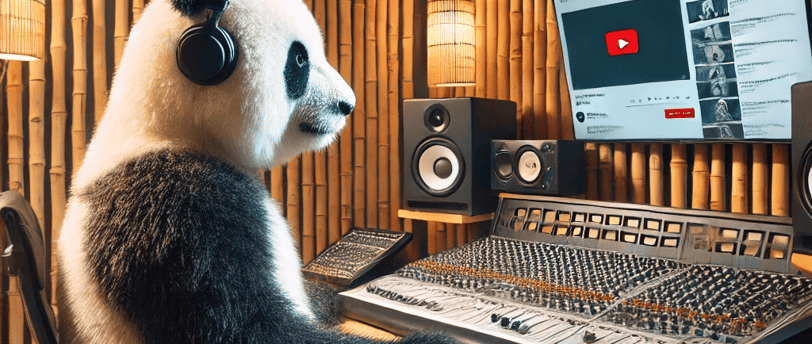AI Copywriting and Copyright: A Growing Challenge for Content Creators
Learn how AI-generated content challenges copyright law and threatens creators' revenue. Discover legal risks, protection strategies, and the future of AI in creative industries..
Dr.Pan
12/10/20244 min read


The creative world is experiencing a seismic shift. As artificial intelligence reshapes how we produce music, videos, and written content, it's also stirring up serious copyright concerns that affect artists and content creators everywhere. Let's explore the complex landscape of AI-generated content ownership and what it means for creators today.
The Heart of the Matter: Who Owns AI-Created Work?
When an AI helps create a song, write a story, or design artwork, who actually owns it? The person using the AI? The company that made the AI? Or maybe no one at all? These aren't just theoretical questions – they have real implications for creators' livelihoods and creative freedom.
Take Sarah, a digital artist who recently used an AI tool to help generate background elements for her illustrations. While she hand-drew the main characters, the AI created intricate cityscapes behind them. When she tried to sell prints of her work, questions arose about whether she could claim full copyright. This is the kind of real-world dilemma creators face daily.
Traditional copyright law is pretty straightforward: if you create something original, you own it. But AI throws a wrench in the works. Take music, for example. Usually, copyright covers things like the melody, lyrics, and arrangement. But when AI gets involved in creating these elements, ownership becomes murky.
The U.S. Copyright Office took a stab at clarifying things in 2023, ruling that AI-generated content isn't eligible for copyright protection unless there's "substantial human authorship." But they left a crucial question unanswered: what counts as "substantial"? If you use AI to create backing tracks but write your own lyrics and melody, does that qualify? The courts haven't figured this out yet.
The YouTube Dilemma: When Algorithms Clash
This uncertainty is hitting YouTubers particularly hard. Take the case of Marcus, a gaming content creator who used AI-generated background music for his videos. He chose tracks from a platform that claimed to be royalty-free. Three months and 50 videos later, he received copyright claims on all of them. Someone had taken the same AI-generated music, claimed ownership, and registered it with Content ID. Marcus lost months of ad revenue and had to remake dozens of videos.
This isn't an isolated incident. YouTube's Content ID system, while sophisticated, wasn't built with AI-generated content in mind. It leads to situations where:
Multiple creators using the same AI-generated music face copyright strikes from each other
Bad actors deliberately claim AI-generated content as their own
Legitimate creators lose revenue while disputes drag on for months
Some creators avoid AI tools altogether, limiting their creative options
Even worse, some people are gaming the system. They upload AI-generated content and falsely claim copyright, knowing that automated systems might flag similar tracks created independently by others. Fighting these claims isn't easy – it often requires legal expertise that many creators simply can't afford.
The International Complication
The problem becomes even more complex when you consider international copyright law. A creator in Japan might use an AI tool based in the United States to create content that's viewed in Germany. Each country has different rules about AI-generated content. For instance:
The European Union is developing specific regulations for AI-generated works
The UK is considering special copyright provisions for AI training data
Some countries don't address AI-generated content in their copyright laws at all
This creates a legal maze for creators trying to reach a global audience. What's perfectly legal in one country might violate copyright law in another.
Real-World Impact on Creative Industries
The ripple effects are being felt across creative industries:
Music Production
Independent musicians are finding themselves in a tough spot. AI music tools can help with everything from mastering tracks to creating backing instruments. But using these tools might make their music ineligible for copyright protection or subject to false claims. Some record labels are now explicitly asking artists to declare whether they used AI in their production process.
Visual Arts
Digital artists face similar challenges. AI art generators have become incredibly sophisticated, but their output exists in a legal gray area. Some artists have found their style being mimicked by AI tools trained on their work without permission. Others worry about accidentally incorporating AI-generated elements that might infringe on existing copyrights.
Writing and Content Creation
Writers using AI writing assistants face questions about originality and ownership. Some publishing houses have started requiring authors to disclose any use of AI tools. Academic institutions are grappling with similar issues around student work and research papers.
Protecting Yourself as a Creator
While we wait for laws to catch up, here's how creators can stay safe:
Choose your AI tools carefully. Stick to reputable platforms with clear licensing terms. Research the company's policies on content ownership and read the fine print about commercial use.
Document everything. Keep detailed records of:
Which AI tools you used
How you modified the AI-generated content
Your creative process and human input
Any licensing agreements or terms of service
Stay informed about changes in AI and copyright law. Follow relevant industry news and join creator communities that discuss these issues.
Consider hybrid approaches. Blend AI assistance with substantial human creativity to strengthen your copyright claims.
Build a copyright defense fund. Set aside money for potential legal consultations or disputes.
Looking Ahead: The Future of Creative AI
The relationship between AI and copyright law will likely evolve significantly in the coming years. We're already seeing:
Proposals for new types of AI-specific copyrights
Platforms developing better systems to track and verify AI-generated content
Creative industries establishing new standards for AI use
Tech companies working on ways to embed ownership information in AI-generated works
For creators, this means staying flexible and adaptable. The tools and rules will keep changing, but the fundamental principles of creative integrity and fair use remain important.
The Bottom Line
The creative landscape is changing faster than our legal systems can keep up. While we wait for clearer guidelines and court decisions, creators need to be especially careful about how they use AI tools. The good news is that these issues are getting more attention, and solutions are likely coming – even if they're not here yet.
Think of AI as a powerful but complex tool in your creative toolkit. Used wisely and with proper documentation, it can enhance your work without putting you at legal risk. The key is staying informed, using trusted tools, and keeping detailed records of your creative process.
Unlock the best deals, coupon codes, and exclusive announcements from your favorite brands – all in one place. Stay informed with up-to-date stories, expert tips, and special offers tailored just for you.
✨ Why Join?
✔ Break Through Mental Blocks: Get expert tips to boost your mindset.
✔ Exclusive Deals & Discounts: Never miss a money-saving coupon or promo.
✔ Stay in the Know: Be the first to hear about new products, events, and insider updates.
📬 Sign Up Now – It’s free, easy, and your all-access pass to what matters most!
© 2024. All rights reserved.
